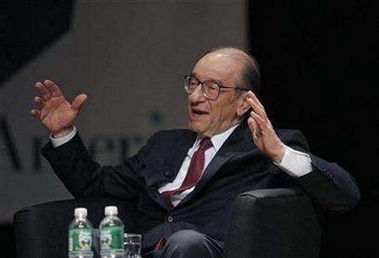Greenspan: US recession risk up, but prices a worry
(Reuters)
Updated: 2007-09-18 05:18
Updated: 2007-09-18 05:18
WASHINGTON - Former Federal Reserve chief Alan Greenspan said on Monday there is an increased risk of a US recession but cautioned that the Fed must still be on guard for a rise in inflation.
 |
"Earlier in the year, I was talking about a one-third probability of a recession," Greenspan told Reuters. "It's come up somewhat, but it's still at this stage somewhat less than 50 (percent)."
He said the possibility of a large drop in house prices poses the biggest risk. A mild decline in home prices accompanied by a big pullback in construction that would help clear inventories would put the economy "in fairly good shape," Greenspan said.
"But if the whole thing festers, it will erode household balance sheets and eventually impact on what the critical support has been in this economy: consumer expenditures," he said.
The former Fed chairman spoke with Reuters and numerous other media outlets to publicize the release of his memoir, "The Age of Turbulence: Adventures in a New World."
The book, for which Greenspan was reportedly paid an $8 million advance, hit store shelves on Monday. It was the No. 1 seller on Web retailer Amazon.com.
Its release comes as the spotlight turns to Ben Bernanke, the former Princeton University professor who succeeded Greenspan on February 1, 2006, and who now faces the biggest test of his tenure.
The Bernanke-led Fed - which has been criticized by some on Wall Street for a slow response as housing-related credit market stress mounted in August - is widely expected to lower interest rates on Tuesday to protect the economy.
Greenspan said the Fed's decision-making comes against a more complicated backdrop than he faced as chairman when rapid globalization was keeping inflation in check, allowing the central bank to cut interest rates aggressively when the U.S. economy stumbled in 2001.
"Disinflation is probably close to its peak now, and obviously as disinflation eases, inflation of necessity is picking up," he said. "I don't expect an inflation surge. I just think we're bottoming out on the disinflationary pressures."
"It's going to make monetary policy a lot more difficult than it was during most of the time when I was chairman."
Greenspan told Dutch newspaper NRC Handelsblad that inflation could rise to about 5 percent in Europe and the United States over time.
"The normal inflation level is closer to 5 percent than the current 2 percent," he said, adding that a 5 percent level fitted economies with a "paper" currency not linked to gold.
Greenspan said in the course of book-related interviews that he doubts he would be reacting differently in the current environment than Bernanke has.
"I'm not sure I would have done anything different were I there," he told CBS television's "60 Minutes" program on Sunday. "I think he's doing an excellent job."
The reappearance in the public eye of the former central bank chair - who was lauded as a "Maestro" and a member of a select "Committee to Save the World" in books and magazines during his time at the Fed - comes as some reassess his legacy in light of the housing slump.
Critics charge that the Fed's decision to slash interest rates to a decades-low 1 percent and to hold them there for a year pumped up a housing bubble whose bursting has placed the economy at risk of recession.
But Greenspan defended the long period of low rates as necessary to fend off the possibility of a deflationary spiral - in which falling prices foster further economic weakness.
"In 2003 ... we thought that the probability of a significant corrosive deflation was definitely less than 50-50, but consequences, were that minority problem to arise, were so potentially destabilizing that we took out in essence an insurance" policy, he told Reuters.
Greenspan told cable news network CNBC that the Fed tried to raise mortgage rates in 2004 to temper a housing boom but was unsuccessful. Indeed, long-term rates set by markets actually moved lower in the early stages of a Fed tightening cycle that began in mid-2004.
Greenspan also challenged another criticism leveled at him: the perception that he endorsed the very adjustable rate mortgages that have led to mounting foreclosures as interest rates have risen and home loans have reset at higher rates.
The former Fed chair says he was saying that borrowers with good credit might save money with an adjustable rate if they were confident they would move before the mortgage reset.
"I was discussing a very narrow set of circumstances," he told Reuters "Indeed, the times I've taken out mortgages, I've taken out a fixed rate mortgage, because I think the insurance that you get, while the price may be high, is worth it."
|
|
|
||
|
||
|
|
|
|